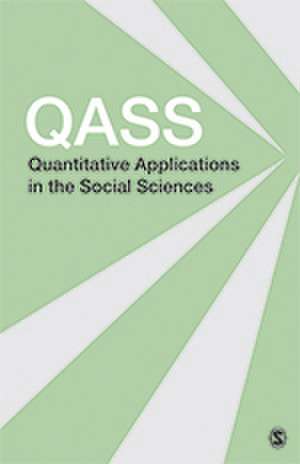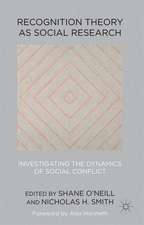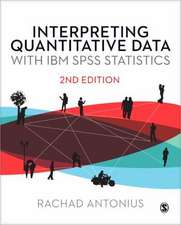Game Theory Topics: Incomplete Information, Repeated Games and N-Player Games: Quantitative Applications in the Social Sciences, cartea 122
Autor Evelyn C. Fink, Scott Gates, Brian D. Humesen Limba Engleză Paperback – 16 iul 1998
Din seria Quantitative Applications in the Social Sciences
-
 Preț: 306.08 lei
Preț: 306.08 lei -
 Preț: 270.02 lei
Preț: 270.02 lei -
 Preț: 270.25 lei
Preț: 270.25 lei -
 Preț: 274.06 lei
Preț: 274.06 lei -
 Preț: 270.29 lei
Preț: 270.29 lei -
 Preț: 304.51 lei
Preț: 304.51 lei -
 Preț: 304.83 lei
Preț: 304.83 lei -
 Preț: 313.80 lei
Preț: 313.80 lei -
 Preț: 305.60 lei
Preț: 305.60 lei -
 Preț: 304.77 lei
Preț: 304.77 lei -
 Preț: 306.14 lei
Preț: 306.14 lei -
 Preț: 273.46 lei
Preț: 273.46 lei -
 Preț: 275.42 lei
Preț: 275.42 lei -
 Preț: 277.33 lei
Preț: 277.33 lei -
 Preț: 305.05 lei
Preț: 305.05 lei -
 Preț: 271.10 lei
Preț: 271.10 lei -
 Preț: 270.63 lei
Preț: 270.63 lei -
 Preț: 305.05 lei
Preț: 305.05 lei -
 Preț: 304.51 lei
Preț: 304.51 lei -
 Preț: 305.28 lei
Preț: 305.28 lei -
 Preț: 270.40 lei
Preț: 270.40 lei -
 Preț: 305.60 lei
Preț: 305.60 lei -
 Preț: 304.77 lei
Preț: 304.77 lei -
 Preț: 306.14 lei
Preț: 306.14 lei -
 Preț: 306.34 lei
Preț: 306.34 lei -
 Preț: 305.40 lei
Preț: 305.40 lei -
 Preț: 306.41 lei
Preț: 306.41 lei -
 Preț: 304.77 lei
Preț: 304.77 lei -
 Preț: 305.60 lei
Preț: 305.60 lei -
 Preț: 304.51 lei
Preț: 304.51 lei -
 Preț: 269.91 lei
Preț: 269.91 lei -
 Preț: 270.40 lei
Preț: 270.40 lei -
 Preț: 269.91 lei
Preț: 269.91 lei -
 Preț: 289.18 lei
Preț: 289.18 lei -
 Preț: 287.82 lei
Preț: 287.82 lei -
 Preț: 316.12 lei
Preț: 316.12 lei -
 Preț: 288.96 lei
Preț: 288.96 lei -
 Preț: 316.71 lei
Preț: 316.71 lei -
 Preț: 314.98 lei
Preț: 314.98 lei -
 Preț: 317.26 lei
Preț: 317.26 lei -
 Preț: 314.60 lei
Preț: 314.60 lei -
 Preț: 289.95 lei
Preț: 289.95 lei -
 Preț: 289.18 lei
Preț: 289.18 lei -
 Preț: 315.36 lei
Preț: 315.36 lei -
 Preț: 314.98 lei
Preț: 314.98 lei -
 Preț: 314.38 lei
Preț: 314.38 lei -
 Preț: 316.33 lei
Preț: 316.33 lei -
 Preț: 316.51 lei
Preț: 316.51 lei
Preț: 314.76 lei
Nou
Puncte Express: 472
Preț estimativ în valută:
60.23€ • 63.05$ • 49.84£
60.23€ • 63.05$ • 49.84£
Carte tipărită la comandă
Livrare economică 05-19 aprilie
Preluare comenzi: 021 569.72.76
Specificații
ISBN-13: 9780761910169
ISBN-10: 0761910166
Pagini: 79
Ilustrații: tables, figures, bibliography
Dimensiuni: 137 x 208 x 5 mm
Greutate: 0.1 kg
Ediția:New.
Editura: SAGE Publications
Colecția Sage Publications, Inc
Seria Quantitative Applications in the Social Sciences
Locul publicării:Thousand Oaks, United States
ISBN-10: 0761910166
Pagini: 79
Ilustrații: tables, figures, bibliography
Dimensiuni: 137 x 208 x 5 mm
Greutate: 0.1 kg
Ediția:New.
Editura: SAGE Publications
Colecția Sage Publications, Inc
Seria Quantitative Applications in the Social Sciences
Locul publicării:Thousand Oaks, United States
Cuprins
Game Theory
How It Is Used
Imperfect and Incomplete Information
Repeated Games
<i>N</i>-Player Games
How It Is Used
Imperfect and Incomplete Information
Repeated Games
<i>N</i>-Player Games
Descriere
Game theory, particularly the use of repeated games, N-person games, and incomplete information games have been popular research techniques in political science, sociology and management, but difficult for new social researchers to use until now.
This book aims makes these topics accessible to all social scientists. Using a common social science game, Chicken, to illustrate the concepts, the book introduces readers to: games of incomplete information; how to build uncertainty into game theoretic models; the concept of Bayesian Nash equilibrium; and the role of repetition.















